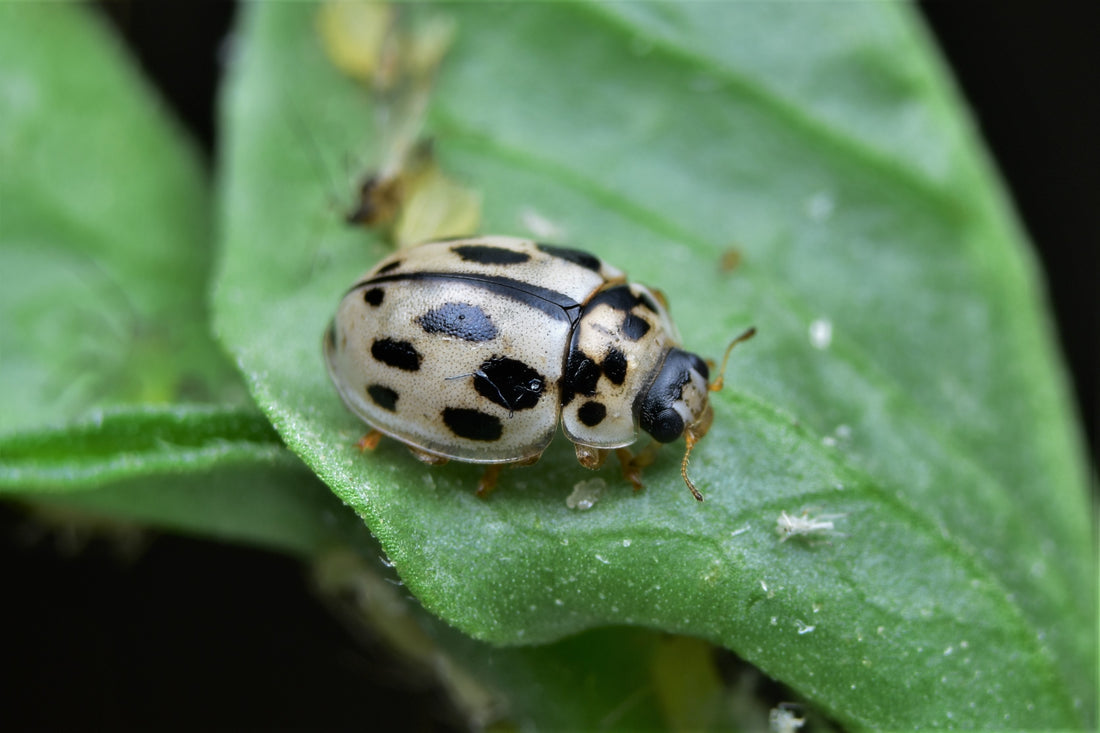The name probably doesn’t mean much to most people, but Propylea is a ladybug. It is commonly known as the 14-spotted ladybird or P-14. Its scientific name is Propylea quatuordecimpunctata. It is an excellent predatory beetle for aphid control.
Aphid biological control
Just like the more famous two-spotted ladybird (Adalia bipunctata), Propylea loves aphids. Yet there is a striking difference between the two species. Propylea feels at home in greenhouses while Adalia prefers to find a place outside to settle down.
For several years now, vegetable growers have been using the 14-spotted ladybug to keep aphids under control. In 2016, Entocare received a report of a beetle that had spontaneously settled in a bell pepper greenhouse. At that time there was a major outbreak of aphids in that bell pepper greenhouse, but the beetle managed to control the pest. We identified the beetle and it turned out to be the 14-spotted ladybug. It is an indigenous predatory beetle that occurs throughout the Netherlands.
From rearing to product
Ultimately, we managed to rear Propylea in-house. In recent years, it has become a popular product that is often ordered in the first half of the year.
Start with introduction in spring
Propylea is best used in spring. They then manage to settle in the greenhouse for a longer period of time. Even in the winter period when a crop rotation has taken place, they are found again. The beetles that remain in the greenhouse are not yet active after overwintering and do not lay eggs yet.
The solution is to introduce Propylea from Entocare’s own cultivation early in the year. The beetles we supply are able to deposit eggs immediately after they have eaten aphids. The hatching larvae need a lot of food for their development and immediately reduce the pest considerably. After a few weeks, the larvae develop into a new generation of adult beetles that immediately attack the aphids again, lay eggs …… a cycle that repeats itself several times per season!


Combating aphids in pepper cultivation: which product do you choose?
Particularly in organic pepper cultivation, Propylea is a welcome addition to the control of aphids. Before the introduction of Propylea, growers were almost entirely dependent on the larvae of the gall midge Aphidoletes (product name APHIDEND). Introduction of parasitic wasps was less successful because hyperparasitization continued to occur. The larvae of Adalia bipunctata were also often used in greenhouses to deal with aphids. Although these predatory beetles can consume a lot of aphids, it turned out that they hardly established themselves in the greenhouse. As a result, they had to be released repeatedly. As a result, the costs for control quickly increased.
With the introduction of Propylea in the spring, you are assured of a population of effective beetles all season long that will keep your aphid infestation under control.
Want to try Propylea?
Are you curious about this product and would you like to try our product Propylea in vegetable cultivation under glass? Send an email to post@entocare.nl or call 0317-411188 and ask for the possibilities.

